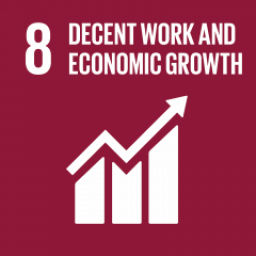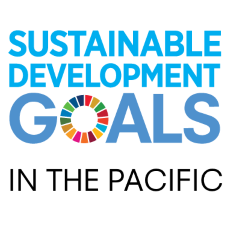
SDG 8 - Decent Work and Economic Growth
Promote sustained, inclusive and sustainable economic growth, full and productive employment and decent work for all
Overall, economic trends in the Pacific region have been positive, yet inconsistent. The restricted economic bases of Pacific Island countries are highly sensitive to external economic shocks (including commodity price fluctuations, supply chain disruptions and financial stress), natural events (such as cyclones, floods and droughts) and costs of adaptation to climate change.
Internal employment factors in the Pacific compound these external factors. The size of the informal economy; gender gaps and imbalances; and high youth unemployment/underemployment are issues that can be monitored under Goal 8.
Tourism is an important sector of growth and development in the Pacific, providing foreign exchange earnings, employment and income earning opportunities for many Pacifc islanders. Tourism is one of the region’s few economically viable sectors, and its share in national GDPs is monitored in this goal.
Sustain per capita economic growth in accordance with national circumstances and, in particular, at least 7 per cent gross domestic product growth per annum in the least developed countries
Indicator 8.1.1: Annual growth rate of real GDP per capita
Click on column to access corresponding country data time series
Achieve higher levels of economic productivity through diversification, technological upgrading and innovation, including through a focus on high-value added and labour-intensive sectors
Indicator 8.2.1: Annual growth rate of real GDP per employed person
NOTE: this indicator is not one of the 132 indicators in the Pacific SDG indicator subset
Promote development-oriented policies that support productive activities, decent job creation, entrepreneurship, creativity and innovation, and encourage the formalization and growth of micro-, small- and medium-sized enterprises, including through access to financial services
Indicator 8.3.1: Proportion of informal employment in non-agricultural employment, by sex
Improve progressively, through 2030, global resource efficiency in consumption and production and endeavour to decouple economic growth from environmental degradation, in accordance with the 10-year framework of programmes on sustainable consumption and production, with developed countries taking the lead
Indicator 8.4.1: Material footprint, material footprint per capita, and material footprint per GDP
NOTE: this indicator is not one of the 132 indicators in the Pacific SDG indicator subset
Indicator 8.4.2: Domestic material consumption, domestic material consumption per capita, and domestic material consumption per GDP
NOTE: this indicator is not one of the 132 indicators in the Pacific SDG indicator subse
By 2030, achieve full and productive employment and decent work for all women and men, including for young people and persons with disabilities, and equal pay for work of equal value
Indicator 8.5.1: Average hourly earnings of female and male employees, by occupation, age and persons with disabilities
Visualisation(s) not yet available
Data not available yet
Indicator 8.5.2: Unemployment rate, by sex, age and persons with disabilities
By 2020, substantially reduce the proportion of youth not in employment, education or training
Indicator 8.6.1: Proportion of youth (aged 15-24 years) not in education, employment or training
Take immediate and effective measures to eradicate forced labour, end modern slavery and human trafficking and secure the prohibition and elimination of the worst forms of child labour, including recruitment and use of child soldiers, and by 2025 end child labour in all its forms
Indicator 8.7.1: Proportion and number of children aged 5-17 years engaged in child labour, by sex and age
NOTE: this indicator is not one of the 132 indicators in the Pacific SDG indicator subset
Protect labour rights and promote safe and secure working environments for all workers, including migrant workers, in particular women migrants, and those in precarious employment
Indicator 8.8.1: Fatal and non-fatal occupational injuries per 100,000 workers, by sex and migrant status
NOTE: this indicator is not one of the 132 indicators in the Pacific SDG indicator subset
Indicator 8.8.2: Level of national compliance with labour rights (freedom of association and collective bargaining) based on International Labour Organization (ILO) textual sources and national legislation, by sex and migrant status
NOTE: this indicator is not one of the 132 indicators in the Pacific SDG indicator subset
By 2030, devise and implement policies to promote sustainable tourism that creates jobs and promotes local culture and products
Indicator 8.9.1: Tourism direct GDP as a proportion of total GDP and in growth rate
Indicator 8.9.2: Number of jobs in tourism industries as a proportion of total jobs and growth rate of jobs, by sex
NOTE: This indicator was selected as one of the 132 indicators in the Pacific SDG indicator subset, but this indicator was removed from the global indicator framework in 2020.
Strengthen the capacity of domestic financial institutions to encourage and expand access to banking, insurance and financial services for all
Indicator 8.10.1: Number of commercial bank branches and automated teller machines (ATMs) per 100,000 adults
NOTE: This indicator is not one of the 132 indicators in the Pacific SDG indicator subset
Indicator 8.10.2: Proportion of adults (15 years and older) with an account at a bank or other financial institution or with a mobile-money-service provider
Visualisation(s) not yet available
View 8.10.2 data on PDH.stat
Increase Aid for Trade support for developing countries, in particular least developed countries, including through the Enhanced Integrated Framework for Trade-Related Technical Assistance to Least Developed Countries
Indicator 8.A.1: Aid for Trade commitments and disbursements
By 2020, develop and operationalize a global strategy for youth employment and implement the Global Jobs Pact of the International Labour Organization
Indicator 8.B.1: Existence of a developed and operationalized national strategy for youth employment, as a distinct strategy or as part of a national employment strategy
NOTE: this indicator is not one of the 132 indicators in the Pacific SDG indicator subset

